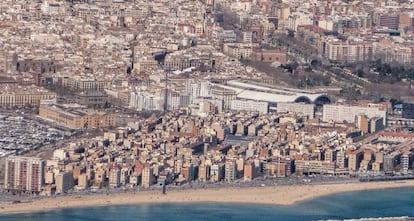How Barcelona hopes to secure the future of its tourism industry
City authorities believe that new multi-pronged planning strategy will make sector more sustainable
Barcelona City Hall has spent two years fighting problems associated with the massive rise of tourism in the city. The battle started in 2015 when left-wing mayor Ada Colau announced a one-year moratorium on accommodation projects including hotels, student residences and hostels – a move that came in the context of a huge surge in the number of beds for visitors in the city: from 23,719 back in 1991 to 69,128 in 2013.

“A process of measured and careful reflection as to the nature of the city’s tourism model starts now,” said Colau after declaring the moratorium.
This was the first of several measures taken to mitigate some of the effects of mass tourism in the city, a problem many residents feel is the city’s most serious, according to a recent survey carried out by authorities.
The objective should be that Barcelona benefits from tourism, not that tourism benefits from Barcelona Xavier Font, Tourism expert
Two years on – and in the wake of a recent incident in which masked individuals stopped a tour bus in the Catalan capital and sprayed it with graffiti – the business community and opposition parties are accusing Colau’s administration of “tourism-phobia.” They argue City Hall is failing to support a sector that generates 15% of Barcelona’s GDP and provides 120,000 jobs.
But the city councilor for business and tourism, Agustí Colom, has defended the administration. “We are working toward a sustainable tourism industry, and one that is compatible with the life of the city. This is the best way that we know to combat tourist-phobia,” he said.
This idea is what lies behind the city’s official tourism planning strategy, known as PEUAT, which Colau hopes will rein in mass tourism in Barcelona. Under that plan, approved in January of this year, Barcelona is divided into three zones depending on their interest as tourism destinations, the number of visitors they already receive and the existing relations between residents and the number of beds for tourists. Critically, the plan also involves a new moratorium on tourism accommodations in the city.
Before the plan was green-lighted, authorities were looking at 107 applications for tourist accommodations. Of those, 74 have now been given the go-ahead because they already had the necessary paperwork before the moratorium was announced. These establishments will open their doors in 2019 at the latest.
However, after that date, the supply of tourist accommodations in the city will stagnate – a situation that has benefited the hotel sector: the value of rooms in four-star establishments has risen from €239,000 to €300,000 according to the consulting firm Bric. Hotels in Barcelona have already seen their assets rise in value by 21%.
Vacation rentals
Barcelona City Hall has also gone out aggressively against illegal vacation rentals, as a constant tussle against vacation rental site Airbnb has shown. A year ago, authorities sent a letter to residents of Barcelona asking them to lodge formal complaints if they knew of the existence of unlicensed vacation apartments.
“The illegal offering of this [tourist] service generates speculation and promotes the underground economy, and could damage neighborly relations in the premises where they [illegal accommodations] are located,” the letter read.
Barcelona’s tourist tax
Barcelona approved a tourist tax in 2011 with City Hall receiving 34% of all proceeds. To date, half of that 34% has gone toward promoting the city but Ada Colau has now set a limit of €4.5 million on that spending.
From 2012 to 2015, Barcelona’s tourist tax brought in €66 million. People staying in five-star hotels pay a tax of €2.25 per night. In four-star hotels that figure is €1.10 and in other establishments the amount paid is €0.65 per night.
In December 2016, only 60% of the vacation apartments in Barcelona were legal. To rectify this situation, City Hall stepped up inspections – although these too have been criticized – and the authorities called on sites such as Airbnb to remove listings for illegal properties. However, the situation is still tense. Recently, a woman was forced to illegally occupy her own apartment after the tenant she had rented it to listed the property without her knowledge on Airbnb.
Sustainable tourism expert Xavier Font argues Barcelona must look carefully at the kind of tourism it is promoting, citing the Slovenian capital of Ljubljana as an example of best practice.
“They have reinvented themselves. They have improved the quality of the experience of those who visit and in this way they have improved the quality of life of residents,” Font explains.
When it comes to Barcelona, Font praises the city for its proactive stance but believes some of the measures are “playing to the gallery.”
“The objective should be that Barcelona benefits from tourism, not that tourism benefits from Barcelona,” he adds.
English version by George Mills.
Tu suscripción se está usando en otro dispositivo
¿Quieres añadir otro usuario a tu suscripción?
Si continúas leyendo en este dispositivo, no se podrá leer en el otro.
FlechaTu suscripción se está usando en otro dispositivo y solo puedes acceder a EL PAÍS desde un dispositivo a la vez.
Si quieres compartir tu cuenta, cambia tu suscripción a la modalidad Premium, así podrás añadir otro usuario. Cada uno accederá con su propia cuenta de email, lo que os permitirá personalizar vuestra experiencia en EL PAÍS.
¿Tienes una suscripción de empresa? Accede aquí para contratar más cuentas.
En el caso de no saber quién está usando tu cuenta, te recomendamos cambiar tu contraseña aquí.
Si decides continuar compartiendo tu cuenta, este mensaje se mostrará en tu dispositivo y en el de la otra persona que está usando tu cuenta de forma indefinida, afectando a tu experiencia de lectura. Puedes consultar aquí los términos y condiciones de la suscripción digital.








































